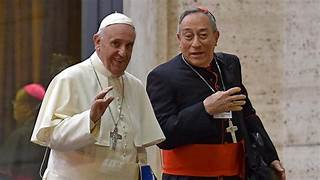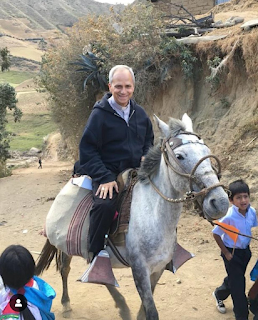To comment please open your gmail account or use my email address, FB Messenger or X. This is not an invitation to Protestant rants which are not posted on this page except to elucidate points of Catholic doctrine.
 |
| Pig's heart in a condom, high altar of the Innsbruck Spitalskirche: an image of the Sacred Heart, says + Glettler |
Bishops are behaving badly: in New Zealand, in Charlotte, North Carolina - and in Rome. Radical Traditionalists (RTs, meaning Catholics who cleave to the roots of the unchanging faith taught by the Church for two millennia) are hot under the collar (not necessarily clerical) about intolerable insults to Christ in the liturgy and the Eucharist, and their protests have been heard - in Charlotte, at least.
"It's Ascension SUNDAY," declared a Catholic of another sort today. He was contradicting an RT who'd referred to Ascension Thursday, which was arbitrarily Sunday-ised by New Zealand's post Vatican II bishops, negating its 40-day relation to Ash Wednesday and Easter, defacing the liturgical calendar based on Genesis 1's mandate for precise definition of holy days. All in the interests of making life here easier and life hereafter, harder.
In Charlotte, North Carolina, Bishop Michael Martin had issued a contemptuous and contemptible diktat cancelling the Latin Mass, priests' vesting prayers (for purity and continence!), kneeling for Communion and chapel veils for women in the sanctuary (where they have no place, anyway). The resulting ruckus among the faithful of Charlotte meant +Martin back-pedalled. He desisted.
Which brings us to the Bishop of Rome, Pope Leo XIV. +Martin had met with Robert Cardinal Prevost as the Prefect for the Bishops' Dicastery, for an hour's ad limina meeting just weeks earlier. Is it likely that +Martin would proceed with his incredible insolence if +Prevost had cautioned him, as he did with his plans to move his cathedral? Or did +Martin believe Rome had his back? https://archive.is/2025.05.27-153122/https://www.nationalreview.com/corner/charlotte-and-the-ghost-of-pope-francis/
And yet another bishop, one in the running for the Archbishopric of Vienna, is Bishop Hermann Glettler of Innsbruck. Watch this video Pope Leo XIV Is About To Promote One Of The WORST Bishops - if you can bear it - and recall that while it wasn't Pope Leo who endorsed this blasphemous man for the episcopate (it was Antipope Francis), +Leo would, as pope, be 100% responsible for +Glettler being appointed to Vienna.
It's time to come to the defence of Christ the King and the millions of souls endangered for ever. We must pray that Pope Leo ll will improve on his record of appointments, which so far has been abysmal. And speak up.
In a world full of sheep and wolves, be a sheep dog.
 |
So off we go to Charlotte with Chris Jackson’s Substack, “Big Modernism":
A Meeting Behind Vatican Walls
On April 1, 2025, Bishop Michael Martin of Charlotte, North Carolina, traveled to Rome for a private, hour-long meeting with Cardinal Robert Francis Prevost, then the powerful prefect of the Dicastery for Bishops. At the time, Prevost was not yet pope but his influence was unmistakable. As head of the Vatican office responsible for appointing bishops, he had a global reach and a record of favoring those who aligned with the Francis program.
Just five weeks later, that same cardinal would be elected Leo XIV.
Most Catholics, even in Charlotte, had no idea the meeting occurred. But it was publicly acknowledged in diocesan news after Leo's election, with Bishop Martin describing Prevost as calm, globally attuned, and deeply interested in the Church’s state in America. These are not random compliments. They read like code. In the language of ecclesial diplomacy, Martin was saying: I met the man, and I know where he stands.
From Courtyard Meeting to Cathedral Homily
Just days after Prevost became Leo XIV on May 8, Bishop Martin wasted no time signaling his allegiance. On May 9, he preached a special Mass in Charlotte and urged Catholics to embrace the new pope’s vision as a spiritual moment of renewal.
But Martin’s message wasn’t about reverence for the papacy or continuity with tradition. It was a call to embrace “unity,” “dialogue,” and “accompaniment;” the slogans of synodality that have become code for marginalizing anything preconciliar.
“Are we seizing this moment?” he asked the congregation, calling for daily recommitment to Christ through acts of spiritual conformity and community.
This wasn’t a homily. It was a soft launch.
 |
| Bishop Michael Martin - just what you'd expect |
The Crackdown Arrives
On May 20, less than two weeks after Prevost ascended the throne, Bishop Martin published a sweeping diocesan decree. Its purpose was unmistakable: to finish what Francis had started in Traditionis Custodes.
Public Latin Masses in parish churches were forbidden. Existing celebrations would be confined to a single diocesan chapel, quarantined like a relic of the past.
The memo bore all the familiar fingerprints. It invoked vague appeals to unity. It cited the pope’s authority. It avoided any hint of pastoral concern or awareness of the real-life suffering these decisions cause.
This was not the act of a bishop navigating ecclesial tensions. It was the confident move of a man who knew (because he had asked) that Rome would not stand in his way.
The April Meeting in Retrospect
Viewed through this lens, the April 1 meeting between Martin and Prevost takes on new significance. It was not merely fraternal or consultative, but preparatory.
At that moment, Prevost had every reason to believe he could be elected pope. And Martin, facing pressure from Rome’s progressive wing, had every reason to seek assurances. Did they speak explicitly about the Latin Mass? We don’t know. But silence can be as revealing as speech.
If Prevost said nothing to discourage a crackdown , or worse, hinted at support, Martin would have left Rome with full confidence that his own crackdown would be blessed by the incoming regime.
And indeed, that’s exactly what happened.
Leo XIV: The Continuity Candidate
Leo XIV’s early papal addresses have only confirmed the fears of many traditional Catholics. His emphasis on synodality, interreligious outreach, and ecological humanism mirrors Francis’s own priorities. What’s missing is any reference to restoration, continuity, or the rights of tradition-loving Catholics.
He has said nothing about Latin Mass communities. That silence is strategic.
By saying nothing, Leo enables bishops like Martin to act without fear of papal correction. The persecution continues not with papal thunderbolts, but with papal silence and episcopal initiative. The green light doesn’t flash; it flickers, quietly, in chancery offices around the world.
 |
| Antipope Francis with Cardinal Oscar Maradiaga, widely credited with helping Francis get elected and the meteoric rise of Cardinal Blase Cupich |
The Real “Synodal Moment”
In his May 9 homily, Bishop Martin exhorted the faithful to “seize the moment.” What he meant, it turns out, was not a renewal of Catholic life but a reckoning. A moment to uproot the traditional Mass, isolate those attached to it, and solidify the new ecclesial order under a friendly pope.
 |
| A friendly pope |
The faithful of Charlotte are left with a choice: comply, scatter, or resist. But let no one say they weren’t warned. The path was chosen not in May, but in April; behind Vatican walls, in a quiet conversation whose effects will echo for years.
The crackdown didn’t come out of nowhere. It came from Rome.
 |
| , |
Update: 5/30/25
On May 29, The Pillar published an article entitled, “At Prevost meeting, Charlotte’s Martin urged to slow down on cathedral project.”
The Pillar piece reports that:
Bishop Martin’s April 1 meeting with Cardinal Prevost was part of an ad limina-style visit for new bishops.
The crackdown on the Latin Mass was already being planned at the time of the meeting.
No direct instructions were given to Martin by Prevost about Latin Mass policy.
A source says Martin merely informed Prevost of the coming changes.
My thoughts:
The timeline remains incriminating.
Even if Martin had already drafted his policy, informing Prevost in person just weeks before a papal conclave, without any pushback, would have strengthened Martin’s confidence that Rome would not oppose him. Silence is permission in episcopal politics.
“No instructions given” is meaningless spin.
Of course Prevost didn’t give explicit directives. He didn’t need to. These men speak in nods and euphemisms. If Martin said, “I intend to restrict the Latin Mass,” and Prevost smiled, nodded, or offered general support for unity and implementation of Traditionis Custodes, that’s all the green light a bishop needs.
The Pillar acknowledges the policy was in formation at the time.
This confirms my point. If the policy was being finalized, the Rome meeting provided exactly the kind of assurance Martin would seek before unleashing a disruptive diocesan directive. The fact that Martin didn’t postpone the crackdown after the meeting shows that whatever tone he got from Prevost gave him zero reason to hesitate.
Framing isn’t neutral.
The Pillar article seems designed more to stabilize the narrative than to explore the underlying dynamics. It leans heavily on anonymous sourcing and presents Martin’s actions as routine, but that doesn’t resolve the deeper questions. It avoids controversy, but the implications remain.https://bigmodernism.substack.com/p/how-bishop-martins-april-meeting?r=7wq1&utm_medium=ios&triedRedirect=true#:~:text=The%20Real%20%E2%80%9CSynodal%20Moment%E2%80%9D
 |
| In a world full of sheep and wolves, be a sheep dog |
Beware of false prophets, who come to you in the clothing of sheep, but inwardly they are ravening wolves. By their fruits you shall know them. Do men gather grapes of thorns, or figs of thistles? Even so every good tree bringeth forth good fruit, and the evil tree bringeth forth evil fruit. A good tree cannot bring forth evil fruit, neither can an evil tree bring forth good fruit. Every tree that bringeth not forth good fruit, shall be cut down, and shall be cast into the fire. Wherefore by their fruits you shall know them.
-Matthew 7: 15-20
No comments:
Post a Comment